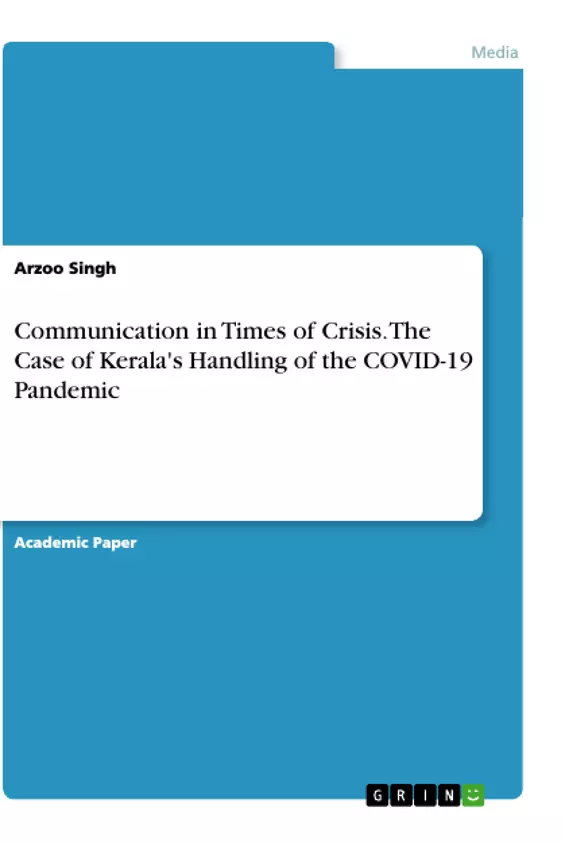This research focuses on the process of communication between the state government and the citizens during a crisis situation and the formulation of an effective response strategy when faced with a significant threat to health or safety. My specific research interests are 1) the nature of decision – making processes that influence the perception of the audience towards the government, and 2) how the government body makes sense of an ambiguous and unpredictable situation, in order to build credibility with the audience and influence their behavior.
This is a qualitative research focusing on Kerala government‘s response to the SARS Covid-19 pandemic crisis in India from the months of January till May. A global public health crisis has the potential to critically harm the nation‘s economy and thus, requires strategic planning to deal with the crisis. However, even though faced with H1N1 influenza pandemic and Nipah Virus epidemic in the past decade, the country still struggles with developing effective response strategy and contingency plans when faced with an unexpected, highly unpredictable public health crisis. My research understands the process between the development of a crisis response strategy and its implementation. Additionally, it also addresses the positive/negative perception created in the minds of the public through media.
Inhaltsverzeichnis (Table of Contents)
- Abstract
- Chapter 1: Introduction
- Chapter 2: Literature Review
- Chapter 3: Research Design
- Chapter 4: Case Study
- Chapter 5: Findings and Analysis
- Chapter 6: Conclusion
- Chapter 7: Further Scope of Research
Zielsetzung und Themenschwerpunkte (Objectives and Key Themes)
This research examines the communication strategies employed by the Kerala government during the COVID-19 pandemic, focusing on the interaction between the government and citizens. The study aims to understand how decision-making processes impact public perception of the government, and how the government navigates an ambiguous crisis to establish credibility and influence citizen behavior.
- The impact of communication on public perception during a crisis
- The effectiveness of communication strategies in managing public health emergencies
- The role of government transparency and accountability in crisis response
- The interplay between communication, decision-making, and public trust
- The influence of media on public perception and behavior during crises
Zusammenfassung der Kapitel (Chapter Summaries)
- Chapter 1: Introduction: This chapter provides an overview of the research topic, setting the context for the study of communication in times of crisis. It highlights the global implications of public health crises, particularly for developing countries like India, emphasizing the need for effective response strategies.
- Chapter 2: Literature Review: This chapter explores existing research on crisis communication, government response to public health emergencies, and the role of media in shaping public perception. It examines theories and frameworks relevant to the study, providing a foundation for the research.
- Chapter 3: Research Design: This chapter outlines the methodology employed in the study, including the research approach, data collection methods, and data analysis techniques. It details the specific case study chosen for the research, focusing on the Kerala government's response to the COVID-19 pandemic.
- Chapter 4: Case Study: This chapter presents a detailed analysis of the Kerala government's communication strategies during the COVID-19 pandemic. It examines the government's actions, communication channels, and the impact of these strategies on public perception and behavior.
- Chapter 5: Findings and Analysis: This chapter analyzes the data collected through the case study, exploring the relationship between government communication, public perception, and citizen behavior. It identifies key themes and patterns emerging from the data, providing insights into the effectiveness of the Kerala government's communication strategies.
Schlüsselwörter (Keywords)
The primary focus of this research lies in understanding the dynamics of communication during crises, particularly the interplay between government communication, public perception, and citizen behavior. Key terms that encapsulate the research include crisis communication, public health emergencies, government response strategies, media influence, public perception, decision-making processes, and the Kerala government's response to the COVID-19 pandemic.
Frequently Asked Questions
What is the focus of the research on Kerala's COVID-19 response?
The research focuses on the communication process between the state government and citizens during the pandemic and how response strategies were formulated and implemented.
How does crisis communication influence public perception?
Effective communication builds credibility and trust. The study examines how government decision-making processes and transparency shape how the public views authority during a threat.
What role did the media play in Kerala's pandemic handling?
The research addresses how media created either positive or negative perceptions in the minds of the public regarding the government's actions and contingency plans.
Why is strategic planning difficult in unpredictable public health crises?
Despite past experiences with H1N1 and Nipah virus, developing effective contingency plans remains a struggle due to the high ambiguity and speed of unexpected outbreaks.
What are the key objectives of the Kerala government study?
The objectives include understanding how to establishment credibility in a crisis, how to influence citizen behavior through communication, and the interplay between transparency and public trust.
- Quote paper
- Arzoo Singh (Author), 2020, Communication in Times of Crisis. The Case of Kerala's Handling of the COVID-19 Pandemic, Munich, GRIN Verlag, https://www.grin.com/document/1152949



